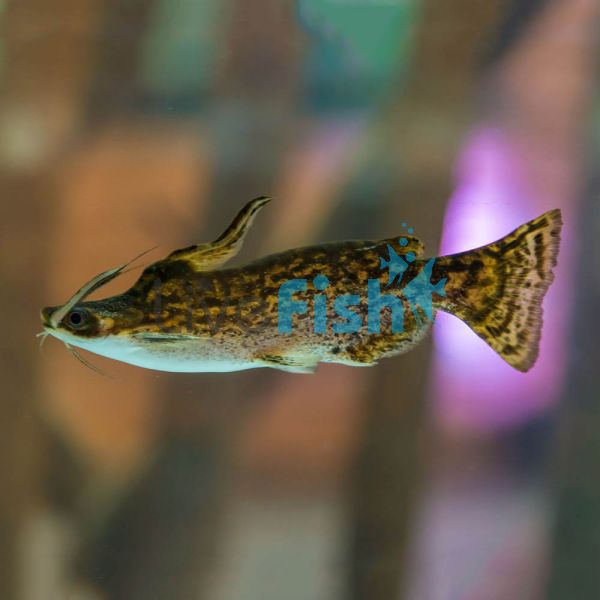Driftwood Catfish 5cm
Driftwood catfish are a truly underappreciated South American oddball fish. As their name suggests this catfish has a close resemblance to a jagged piece of driftwood with twig-like barbels and fins along with a very natural and mottled colour scheme. These are absolutely amazing fish to add to a biotope or blackwater aquarium due to their wild look and though they aren’t fish that spend a lot of time in the open, they add a really interesting dynamic to the aquarium with their secretive and wild aesthetic.
Though the driftwood catfish does have an earthy colour palette, they aren’t like most catfish that just have a single bland colour scheme. The golden-brown base colour is complemented with a dark brown mottling that goes from head to tail, this is contrasted with the striking white underbelly. The driftwood catfish is not just interesting with its colours but also with the unique and stocky body shape, the thicker barbels, uniquely curved dorsal fin, and broad tail really make this fish unlike others found in the aquarium trade.
Driftwood Catfish
Driftwood catfish are a truly underappreciated South American oddball fish. As their name suggests this catfish has a close resemblance to a jagged piece of driftwood with twig-like barbels and fins along with a very natural and mottled colour scheme. These are absolutely amazing fish to add to a biotope or blackwater aquarium due to their wild look and though they aren’t fish that spend a lot of time in the open, they add a really interesting dynamic to the aquarium with their secretive and wild aesthetic.
Though the driftwood catfish does have an earthy colour palette, they aren’t like most catfish that just have a single bland colour scheme. The golden-brown base colour is complemented with a dark brown mottling that goes from head to tail, this is contrasted with the striking white underbelly. The driftwood catfish is not just interesting with its colours but also with the unique and stocky body shape, the thicker barbels, uniquely curved dorsal fin, and broad tail really make this fish unlike others found in the aquarium trade.
Driftwood catfish are not particularly aggressive unlike other predatory catfish, they will potentially eat tank mates smaller than their mouth size but aside from this small risk they are not a predator by nature. They also get to a maximum size of 28 cm which makes them a sizeable fish by aquarium standards, however, are very hardy and easy to care for. Being a tropical fish, it is best to keep the driftwood catfish in temperatures between 24-28 degrees they do require a fairly large aquarium due to their larger growing size. Breeding these fish is actually a fairly easy process and they breed much like a pleco species would, males and females can be told apart as males have a sear head-shaped ventral fin. The male firstly fertilizes its mate and the female then proceeds to lay the fertilized eggs in a cave to incubate.
Tank Recommendations for your Driftwood Catfish
The Driftwood catfish get fairly large at almost 28 cm long, their girth body also means it is best to keep them in an aquarium that is at least 450 liters at the bare minimum. Though they are not an active species, it is best to have that water volume to support the bioload of this fish and any other tank mates.
It is also recommended to give them a lot of hiding places to support their shy nature and this can be through the use of some rock caves and pieces of driftwood they can hide within. The substrate is not too much of a concern, driftwood catfish can be kept on either sand or gravel and they can be kept safely with plats as well.
Suitable Tank Buddies
Because of their peaceful nature, it is best to avoid any aggressive tank mates that could pester the driftwood catfish. When threatened these fish instinctively go for cover as they do not have any protective scales, an aggressive tankmate may cause the driftwood catfish to just hide all day and potentially waste away.
Usually Compatible
Geophagus, Severum, Angelfish, ghost knife fish, and other peaceful but large fish.
Sometime Compatible
Fire mouth cichlids, jack Dempsey, convict cichlids, and other semi-aggressive fish could show territorial behavior towards the driftwood catfish.
Rarely Compatible
Oscars, Jaguar cichlids, and other aggressive fish species may show excessive aggression towards the driftwood catfish. Small and slow nano fish such as neon tetras should be avoided as well as these fish will become prey.
Feeding your Driftwood catfish
The driftwood catfish should be a fairly easy species to feed, they will take to a wide range of aquarium foods but due to their bottom-welling nature, it would be best to feed them sinking pellets. This can be complemented with black worms, frozen bloodworms, and similar live or frozen foods. Feeding can be done at any time of the day and these fish should eat however if they are being very shy it may be better to do so as the lights go out on the aquarium
| Scientific Name | Trachelyopterus fisheri |
|---|---|
| Care Level | Easy |
| Common Names | Driftwood Catfish |
| Diet | Omnivore |
| Fish Family | Auchenipteridae |
| Lifespan (years) | 10 |
| Max. Length (cm) | 28 |
| Min. Tank Volume (l) | 450 liters |
| Origin | South America |
| Sociability | Peaceful |
| Venomous | No |
| Water Conditions | 22 - 26° C, pH 6 - 7 |
-
0can you keep with discus???Read Detail
 Submited by: Hamish Christie
Submited by: Hamish Christie
 23 Feb 2021
23 Feb 2021
-
They are usually compatible with Discus. Bristlenose and Corydoras are also compatible. But I would stay away form Tnadanus and Eel-Tailed Catfish. Read full answerAnswered by Admin on 09 Mar 2021
-
- 1




